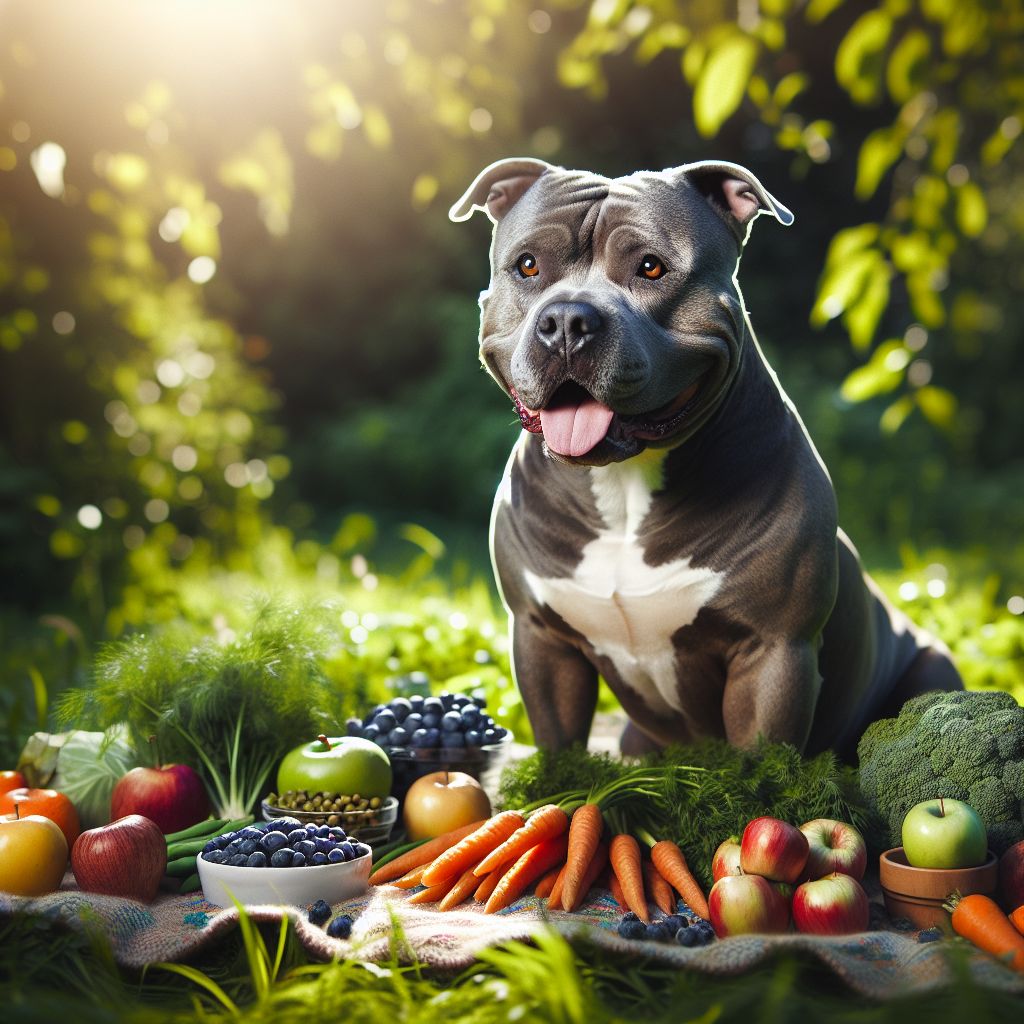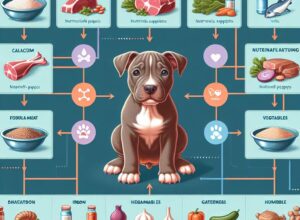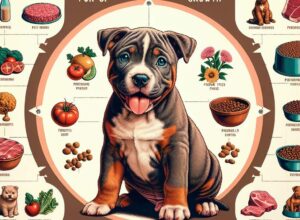
Key Takeaways
- Pitbull puppies need a diet rich in protein, healthy fats, carbohydrates, vitamins, and minerals for optimal growth.
- Incorporating fruits like blueberries, apples, and bananas can boost your puppy’s vitamin and antioxidant intake.
- Vegetables such as carrots, pumpkin, and spinach offer essential nutrients while promoting digestive health.
- It’s essential to understand which fruits and vegetables are safe for your pitbull puppy and which to avoid.
- Always introduce new foods gradually to your puppy’s diet to avoid digestive upset.
Power Foods for Your Pitbull Puppy
When it comes to feeding your pitbull puppy, think of their diet as the foundation of their future health. Just like a young athlete in training, your puppy needs the right mix of nutrients to grow strong and healthy. That’s where power foods come in. These are nutrient-dense foods that pack a punch when it comes to supporting your puppy’s growth and development.
Fueling Growth with the Right Nutrients
Ensuring your Pitbull puppy gets the best start in life means fueling growth with the right nutrients. A balanced diet rich in proteins, fats, and carbohydrates, along with essential vitamins and minerals, is crucial for their development.
Let’s get to the meat of the matter. Your pitbull puppy’s diet needs to be balanced and complete. This means the right proportions of protein for muscle development, fats for energy, and carbohydrates for endurance. But that’s not all; vitamins and minerals are crucial for bone health and immune function, and fruits and vegetables are excellent sources of these.
- Protein: Essential for muscle growth and repair. Look for high-quality sources like chicken, beef, or fish.
- Fats: Needed for energy and the absorption of vitamins. Sources include fish oil and flaxseed oil.
- Carbohydrates: Provide energy and support digestion. Opt for whole grains and certain fruits and vegetables.
- Vitamins and Minerals: Support overall health and are found abundantly in fruits and vegetables.
Top Fruits for a Balanced Puppy Diet
While not all fruits are suitable for dogs, many are excellent for your pitbull puppy’s diet. These fruits not only provide natural sweetness but also come loaded with vitamins, minerals, and antioxidants that can help protect your pup’s cells from damage.
Vegetables That Provide a Nutritional Punch
When it comes to optimizing your pitbull puppy’s diet, incorporating vegetables can provide a significant nutritional boost.
Vegetables are another group of foods that should be included in your pitbull puppy’s diet. They’re low in calories, high in fiber, and full of essential nutrients. Just remember, the way you prepare them can affect their nutritional value. We’ll delve into the best ways to serve these veggies to your pup a bit later on.
Protein and Your Pitbull Puppy
Understanding the role of protein in your Pitbull puppy’s diet is crucial for their growth and development. Ensuring they get enough high-quality protein will support their muscle development and overall health.
Protein is the cornerstone of a pitbull puppy’s diet. It’s vital for building strong muscles and repairing tissues. Your puppy is growing fast, and without enough protein, they won’t develop the muscle mass and strength they need.
The Need for High-Quality Protein Sources
Pitbull puppies require diets rich in protein to support their rapid growth and high energy levels. It’s important to focus on high-quality protein sources to ensure they develop strong muscles and healthy bones.
When selecting proteins for your pitbull puppy, the quality is just as important as the quantity. High-quality proteins contain all the essential amino acids your puppy needs and are easily digestible. Animal-based proteins are generally superior because they provide the right balance of amino acids tailored to a carnivore’s needs.
Animal Proteins vs. Plant Proteins
Understanding the difference between animal proteins and plant proteins is crucial for a balanced diet in your pitbull puppy’s nutrition.
While plant proteins can be part of a healthy diet, they should not be the sole source of protein for your pitbull puppy. Animal proteins from meat, fish, and eggs are more complete and provide the nutrients your puppy needs to thrive.
Fruits: Nature’s Sweet Vitamins
Fruits are more than just a tasty treat for your pitbull puppy; they’re packed with vitamins and minerals that support overall health. But remember, moderation is key. Fruits contain natural sugars, so they should be given as part of a balanced diet.
Blueberries for Antioxidants
Blueberries are a fantastic source of antioxidants, which are vital for the immune system of your Pitbull puppy. Including blueberries in their diet can help support their overall health and vitality.
Blueberries are a superfood, not just for humans but for puppies too. They’re rich in antioxidants, which help fight free radicals in the body, reducing the risk of chronic diseases and supporting overall health.
Let’s pause here for a moment. Before we dive deeper into the best fruits and vegetables for your pitbull puppy, it’s essential to remember that every puppy is unique. Their needs can vary based on their activity level, size, and health. Therefore, it’s always a good idea to consult with a veterinarian before making significant changes to your puppy’s diet. They can provide personalized advice to ensure your puppy gets the nutrients they need to grow up healthy and strong.
Bananas for Potassium
Bananas are a fantastic snack for your pitbull puppy because they’re high in potassium, an essential mineral that supports heart and muscle function. They also provide vitamin C, vitamin B6, and dietary fiber, which can aid in digestion. A few slices of banana can be a great reward during training sessions, but be sure to limit the quantity to avoid excess sugar and calories.
Vegetables: More Than Just a Green Bite
Incorporating vegetables in your Pitbull puppy’s diet can be beneficial for their overall health and development. Not only do they provide essential nutrients, but they also add variety to their meals and help maintain a healthy weight.
Vegetables are not just a low-calorie snack. They are a powerhouse of nutrition, providing essential vitamins, minerals, antioxidants, and fiber that contribute to your pitbull puppy’s overall health. Integrating vegetables into your puppy’s diet can support their immune system, promote healthy digestion, and even improve their coat’s shine.
Carrots: A Crunchy Source of Beta-Carotene
Carrots are not only a tasty treat for your pitbull puppy but also provide essential nutrients like beta-carotene, which is crucial for maintaining healthy vision. To learn more about the benefits of including vegetables in your pitbull puppy’s diet, check out our detailed guide.
Carrots are a great choice for your pitbull puppy’s diet. They are rich in beta-carotene, which the body converts into vitamin A, essential for good vision, skin health, and immune function. Chewing on carrots can also help maintain your puppy’s dental health by removing plaque. Just remember to cut them into bite-size pieces to prevent choking.
Pumpkin for Digestive Health
Pumpkin is another excellent vegetable to add to your pitbull puppy’s diet. It’s high in fiber, which can help regulate your pup’s digestive system, and it’s also a good source of vitamins A, E, and C. Plain, cooked pumpkin (not the spiced pie filling) can be a great addition to meals, especially if your puppy is experiencing digestive issues.
Spinach: Iron and More for Your Puppy’s Growth
Spinach is packed with nutrients like iron, which is vital for healthy blood cells, and antioxidants that protect the body. However, spinach should be given in moderation due to its high oxalic acid content, which can interfere with calcium absorption and potentially lead to kidney stones. A little bit of spinach can go a long way in boosting your puppy’s nutrient intake. For more information on fruits and vegetables, dogs can or can’t eat, check out the American Kennel Club’s guidelines.
Combining Fruits and Vegetables in the Diet
Integrating a variety of fruits and vegetables into your Pitbull puppy’s diet is essential for providing a balanced spectrum of nutrients. This practice not only ensures that your puppy gets a range of vitamins and minerals but also promotes better digestion and overall health.
Incorporating fruits and vegetables into your pitbull puppy’s diet can be a fun and nutritious way to add variety. You can mix them into their regular meals, use them as ingredients in homemade treats, or give them as stand-alone snacks. The key is to ensure that fruits and veggies are not replacing the essential components of their diet but complementing them.
Raw vs. Cooked: What’s Best for Your Pet
Some vegetables are more beneficial to your puppy when cooked, as they can break down the cell walls, making nutrients more accessible. For example, cooking carrots can increase the availability of beta-carotene. On the other hand, fruits are typically best served raw to preserve their vitamins and prevent the breakdown of beneficial enzymes.
However, always remove seeds and pits from fruits like apples and peaches, as they can be toxic or cause intestinal blockages. And remember, any dietary changes should be introduced slowly to prevent stomach upset.
Integrating Veggies into Meals
To integrate vegetables into your pitbull puppy’s meals, start by adding small amounts of finely chopped or pureed veggies to their regular food. This can enhance the flavor and provide additional nutrients. Over time, you can increase the quantity as your puppy gets used to the new tastes and textures.
Creating Fruit-Based Treats
When preparing homemade treats for your pets, it’s important to know which fruits and vegetables dogs can or can’t eat. Not all fruits and veggies are safe for canine consumption, so be sure to do your research before adding them to your Pitbull puppy’s diet.
Creating fruit-based treats can be a great way to reward your puppy while also providing them with a healthy snack. Freeze slices of banana or apple for a cool treat on a hot day, or blend fruits into a smoothie and pour it into a mold for a frozen pup-sickle. Just be sure to avoid any added sugars or artificial sweeteners. For more information on which fruits and vegetables are safe for dogs, check out the Fruits and Vegetables Dogs Can or Can’t Eat guide by the American Kennel Club.
Common Pitfalls to Avoid
When incorporating fruits and vegetables into your pitbull puppy’s diet, it’s crucial to be aware of common pitfalls. Not all fruits and vegetables are safe for dogs, and some can be outright dangerous. Grapes and raisins, for example, can cause kidney failure in dogs, while onions and garlic can lead to anemia.
It’s also important to consider the size and quantity of the fruits and vegetables you’re offering. Large chunks can pose a choking hazard while overfeeding can lead to obesity or digestive issues. Always cut food into appropriate sizes and follow the 90/10 rule: 90% of your puppy’s daily calories should come from their balanced dog food, and only 10% from treats, including fruits and vegetables.
Fruits to Avoid: Not All Are Safe
As beneficial as fruits can be, some should never find their way into your pitbull puppy’s bowl. For a detailed guide on pitbull puppy nutrition, here’s a quick rundown of fruits to steer clear of:
- Grapes and raisins: Even in small amounts, these can cause kidney failure.
- Avocado: Persin, found in avocados, can be toxic to dogs.
- Cherries: The pits contain cyanide, which is poisonous to dogs.
- Citrus fruits: While a small amount might not hurt, citrus can cause stomach upset.
It’s better to be safe than sorry. If you’re ever unsure about a fruit, a quick consultation with your vet or a bit of research can save you from potential issues.
Vegetables That May Cause Harm
Similarly, some vegetables are no-go’s for your growing pitbull puppy. For more information on pitbull puppy diet tips, including which vegetables to avoid, click here.
- Onions and garlic: Can cause anemia by destroying red blood cells.
- Raw potatoes: Contain solanine, which is toxic to dogs.
- Rhubarb leaves: High levels of oxalic acid can lead to kidney failure.
Always keep these out of reach and focus on the many safe and nutritious vegetables available.
FAQs
How Much Fruit Can a Pitbull Puppy Eat?
Understanding the right amount of fruit in your pitbull puppy’s diet is crucial for their health. Learn more about fruit and vegetable intake for pitbull puppies to ensure a balanced diet.
When it comes to fruit, moderation is key. As a general guideline, fruits should make up no more than 10% of your puppy’s daily caloric intake. This ensures they’re getting the bulk of their nutrition from their balanced puppy food, which is specially formulated to meet their growing needs. A slice of apple or a few blueberries can go a long way as a treat.
What Vegetables Are Toxic to Dogs?
Beyond the vegetables already mentioned, mushrooms can also be dangerous, especially wild ones, which can be highly toxic. Always stick to dog-safe vegetables and consult with your vet if you’re ever in doubt.
Can Puppies Eat Raw Vegetables?
While many vegetables are a healthy snack for adult dogs, puppies have different nutritional needs. It’s essential to consult a list of fruits and vegetables dogs can or can’t eat before introducing raw veggies to your puppy’s diet.
Yes, puppies can eat raw vegetables, but they should be introduced slowly and in small quantities. Some vegetables might be easier to digest when cooked, such as sweet potatoes or squash. Always chop raw vegetables into small, manageable pieces to prevent choking.
Are There Any Benefits to Grain-Free Diets?
Grain-free diets have become popular, but they’re not necessary for all dogs. Some dogs may have allergies or intolerances to grains and might benefit from a grain-free diet. However, for most dogs, whole grains can be a healthy part of their diet, providing essential nutrients and fiber. Always consult with your vet before making any major dietary changes.
What’s the Best Way to Transition My Puppy to a New Diet?
Transitioning to a new diet should be a gradual process over a week or more. Start by mixing a small amount of the new food with the old, slowly increasing the proportion of new food while decreasing the old. This helps prevent digestive upset and allows your puppy to adjust to the new flavors and textures.
Remember, your pitbull puppy’s diet is the cornerstone of their health. By choosing the right fruits and vegetables, you’re not just giving them a tasty treat; you’re supporting their growth, development, and overall well-being. Be mindful of their individual needs, consult with your vet, and enjoy the journey of watching your puppy grow into a strong, healthy dog.



